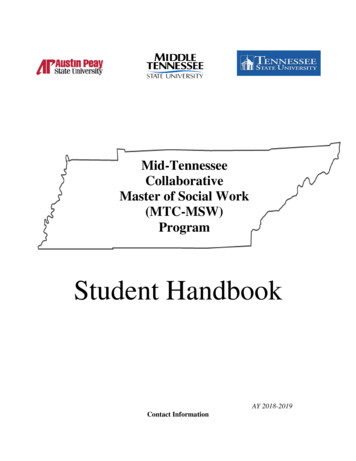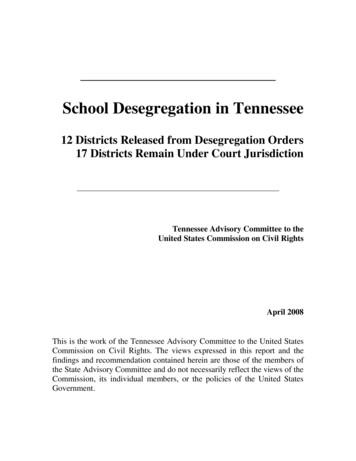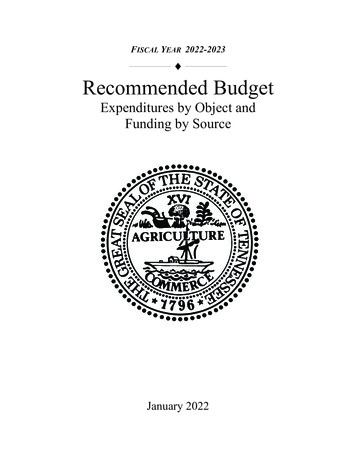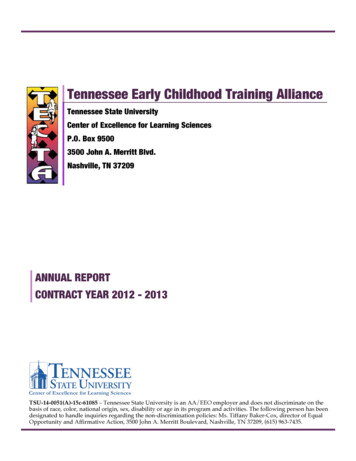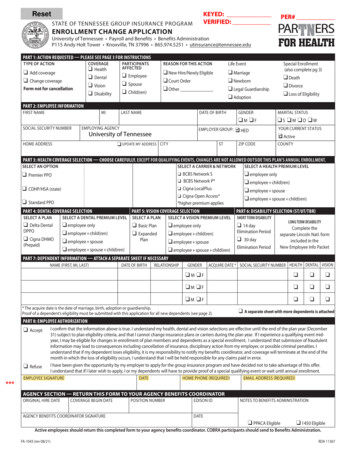
Transcription
13-14Student Handbook
ContentsMission 1Advising 2College of Business Administration Values 4Technology and Scholarships 5Curriculum 6Structure of the Curriculum 6Universal Tracking (uTrack) 7Structure of First and Second Years with Milestones 7General Education Requirements 8Pre-Business Core 10Acceptance into the College of Business Administration 11Minors 11Business Core 12Majors 132013 Majors with Collaterals and Dual Concentrations 14Collaterals and Dual Concentrations 15International Opportunities 16Global Leadership Scholars (Honors Program) 17Majors 18Accounting 18Business Analytics 20Economics 23Finance 25Human Resource Management 28Management 30Marketing 32Supply Chain Management 35Public Administration 38Graduation 39Professional Development 40Professional Development Certification Program 40Internships 41Business Honor Societies and Student Organizations 41Advanced Placement Credit 43Resources 442013–2014 Academic Calendar inside back cover
MissionWelcomeDear Students:Welcome to the College of Business Administration at the University of Tennessee. We have created this handbook to assistyou with your academic career. You should use this handbook inconjunction with UT’s online Undergraduate Catalog and Hilltopics(the official handbook for all university students). Hold on to thisbook. The answers to many of the questions you now have andwill ask during the year can be found here.With that said, allow me to introduce myself. I am the Director ofUndergraduate Programs located in 342 Haslam Business Building. The goal of our office is to help you design your academicstrategy as you pursue your individual aspirations. We will challenge you to take responsibility for your intellectual developmentand make the choices that will culminate in your education.As you know, not all learning occurs in the classroom. In manycases, your experiences with problem solving, negotiating theuniversity system, working with faculty and staff, and assumingresponsibility for your education are the most critical components of your university experience.I am very privileged to work in a profession where I spend themajority of my time revealing opportunities and helping individuals fulfill their dreams. The Undergraduate Programs staff and Ilook forward to assisting you in any way we can.Sincerely,George DrinnonDeveloping Mindful Leaders of Worthy EnterpriseThe mission of the College of Business Administration is to developmindful leaders of worthy enterprise. We accomplish this missionthrough maintaining an appropriate balance of degree programs,research, executive education, outreach, and lifelong learning.With respect to the undergraduate program, the College of Business Administration emphasizes constant curriculum innovation,the globalization of all degree programs, and the implementationof new learning technologies.College of Business Administration Undergraduate ProgramsThe mission of the college’s Undergraduate Programs office is toprovide comprehensive academic and educational program planning that promotes integrity and responsibility within a diverseenvironment. We accomplish this mission through academicplanning, management of the admissions process, recruitmentand retention, management of student data and enrollment, andadministration of scholarship programs.Central to every one of our activities is the academic advising experience. Achieving our mission requires a collaborative effort betweenstudents and advisors.What exactly do we mean by “collaborative effort”?You have to participate, take an interest, and be responsible.It is your future, and no one cares about it more than you.Page 3
AdvisingAcademic advisingUT VisionAcademic advising at the University of Tennessee will be recognizedfor effectively fostering student success through implementationof exemplary practices.UT MissionThe University of Tennessee recognizes academic advising to bea critical component of the educational experience and studentsuccess. Faculty, administrators, and professional staff promote academic advising as a shared responsibility with students. Academicadvising serves to develop and enrich students’ educational plansin ways that are consistent with their personal values, goals, andcareer plans, preparing them for a life of learning in a global society.Advising in the College of BusinessAdministrationAcademic advising is an integral part of your university experience.While the university’s policy requires students to have one mandatory academic planning session per year (unless you have earnedfewer than 30 hours at UT, are on academic probation, or havenot declared a major within aAcademic Probation:specific college), the College of Students are placed on academicBusiness Administration consid- probation when either their cumulativeGPA falls below 2.00 for one semester orers academic planning to be so when their semester GPA falls below 2.00critical that we require our stu- for two consecutive terms of enrollment.dents to meet with an advisorevery fall and spring semester.Our centralized advising delivery allows you to choose an academicadvisor with whom you can continue to consult throughout youracademic career. Advising is much more than simply a time toselect courses for the next semester; it is an opportunity for youand your advisor to develop and evaluate the academic plans thatwill enable you to reach your academic goals.Once you begin taking 300-level courses in your major, academicadvising is supplemented with career and professional advisingfrom faculty members in your major. Once per term, the faculty willinvite you to an open forum so you can learn about professionalopportunities and get to know the faculty and their interests. Youshould identify faculty in your major with whom you share common interests and communicate with them regularly.Page 4Student Learning OutcomesStudents will demonstrate they know curricular requirements, milestone courses, and course sequencing related to a chosen/intended academic program inorder to graduate in a timely fashion the career and professional development opportunitiesavailable, as well as on-campus support for identification andexploration of career paths academic policies and procedures campus resources and support systems that promote academic successStudents will demonstrate they can develop an academic plan and assess degree progress throughgraduation critically reflect upon academic and career goals develop skills and strategies for academic success that include accessing and using institutional resources, policies,and procedures take responsibility for making decisions regarding their academic successStudents will demonstrate they value/appreciate the importance of academic planning and their role in theprocess the importance of enhancing their degree with co-curricular/extracurricular and inter/intracultural experiences their responsibilities as educated citizens of UT and of a democratic, diverse, and global society the educational process and learning across the lifespanUndergraduate Programs342 Haslam Business Building338 Haslam Business Building (Advising Suite)(865) 974-5096Hours of Operation: Monday–Thursday 8:00 a.m. to 6:00 p.m.Friday 8:00 a.m. to 5:00 p.m.To schedule an advising appointment, visithttp://bus.utk.edu/undergrad
AdvisingStudent and Advisor ResponsibilitiesTo assist with the success of your academic advising sessionsand your academic career, it is your responsibility toIt is your advisor’s responsibility to be accessible to you during reasonable hours review your curriculum online at http://bus.utk.edu/undergrad or through this Student Handbook or the onlineUndergraduate Catalog at http://catalog.utk.eduprovide a means through which you can schedule appointments understand the curriculum, graduation requirements, anduniversity policies ensure you are meeting academic retention standards provide accurate information write down a tentative plan for next semester and anyquestions you have for your advisor discuss specific university, college, and departmentalrequirements, procedures, and deadlines keep copies of your relevant academic records be aware of course prerequisites and corequisites andselect appropriate courseshelp you define and develop realistic goals and discuss thelinkage between academic preparation and careeropportunities consult with your advisor before making drastic changes toan agreed-upon schedule consult with your academic advisor on issues related toacademic progress, a change in program, registration forstudy abroad, internships and co-ops, courses to be takenat another institution, withdrawal from courses, or withdrawal from the universityassist you in planning programs of study, both short-termand long-term, that are consistent with your abilities andinterests, by consideringCourse Load:course load, academic backFull-time course load is 12 hours. Themaximum number of hours you canground, program demands,take in a fall or spring semester is 19.and employment or personalMost students take 15 to 16 hours. Youcan take a maximum of three hours incommitmentsmini-term and 12 hours in summer. help you identify special needsand acquaint you with services and programs provided by thecollege and the university schedule an advising appointment EARLY each semesteronline at http://bus.utk.edu/undergrad be aware of academic policies and procedures be aware of campus resources and support systems thatpromote academic success be aware of career and professional development opportunities available, as well as on-campus support for identification and exploration of career pathsrefer you to other services, departments, and specificindividuals as special needs are identified monitor your progress toward educational goals and keepaccurate, up-to-date records of academic progress critically reflect on academic and career goals assist in the petitioning process for exception to policy understand the importance of enhancing your degree withco-curricular and inter-/intra-cultural experiences help you assume responsibility for your decisions and actions respect your right to privacy of educational records anddiscuss confidential information only with appropriate individuals and for the purpose of serving your best interests make final decisions and take responsibility for youracademic career understand your responsibilities as an educated citizen ofUT and of a democratic, diverse, and global societyYour Right to Privacy:Did you know that without your consent, we are not allowed to discuss your academicrecord with anyone, including your parents? If you want us to be able to discuss yourrecords with your parents (or anyone else you designate), you can grant them access bylogging into MyUTK and completing the FERPA Academic Release Form located in theAcademic Links box on the main page. For your protection, your completed consent formexpires within one year of its execution or until revoked. Additional information may beobtained at http://ferpa.utk.edu.Page 5
College of Business Administration VAluesCollege of Business Administration Statement of Community ValuesWe, the members of the College of Business Administration community—students, faculty, and staff—shall work togetherin striving for excellence in every aspect of our college’s activities. We seek to be a model of how members of an academiccommunity can combine their spirit and talents to achieve institutional excellence.We understand that in striving for excellence, our personal and institutional integrity is our most precious asset. Accordingly,we accept accountability for our behavior and will not knowingly act in ways that damage that integrity. In particular, wewill not tolerate cheating by any member of our community in any situation.We commit ourselves to performing our work and fulfilling our responsibilities honestly and professionally. We shall treateach other with respect, honoring the dignity and value of each member of our community. We will cooperate with eachother and fulfill our mutual commitments.Office of Diversity InitiativesThe Office of Diversity Initiatives, located in 328 Haslam Business Building, leads efforts to build a diverse college community by fostering a climate of respect as well as celebrating and embracing diversity. The college stands firm in the beliefthat an appreciation of individuals from a multitude of backgrounds and experiences is a necessity in the global workforce.We create and sustain a welcoming, supportive, and inclusive climate through goals such as attracting and retaining faculty and staff from diverse backgrounds; attracting, retaining, and graduating students from historically under-representedpopulations; and ensuring that undergraduate curricular requirements include significant intercultural perspectives.We recognize diversity in the broadest sense.Page 6
Technology and scholarshipsLaptopsScholarshipsBy the second semester of your second year, you are required tohave a laptop computer. Exposure to and mastery of technologyprepares you to excel in today’s network-driven businessenvironment. The College of Business Administration hasintegrated technology into its curriculum in a number of ways,including the use of the university’s campus-wide wireless networkand our course-management system—called “Blackboard”—athttp://online.utk.edu. You will use your NetID to access theBlackboard system, as well as other university services.A limited number of scholarships are available for highly qualifiedstudents. Selection criteria considered for scholarships includeacademic merit, financial need, and leadership. The college offersthree types of scholarships: college, departmental, and studyabroad.NetID:When you enroll at the university, you are provided a NetID to be used for your e-mail account,for access to Blackboard, to register for classes, for the university’s campus-wide wirelessnetwork, and for the College of Business Administration’s courses on the web. A student’se-mail address is “NetID”@utk.edu (i.e., jsmith15@utk.edu).The official University of Tennessee policy requires that all undergraduate students musthave an activated university-supplied e-mail address. This e-mail address is utilized for officialuniversity communication. Students are held accountable for information contained in officialuniversity mailings to their university-supplied e-mail address.To be considered for and/or maintain a college or departmentalscholarship, you must meet the following criteria: You have two sources for technology support on campus:Office of Information Technology (OIT)Walk-in consulting, The Commons974-9900; http://oit.utk.eduBookstore Technology CenterUniversity Center, Second Floor974-2930; https://utbookstore.org/technologyStudents receiving financial aid may be eligible for a one-timeallowance for the purchase of a laptop. Contact the Office ofFinancial Aid and Scholarships at 115 Student Services Buildingfor more information. The University of Tennessee has negotiatedproducts and special pricing through a number of vendors. Theseproducts are available at the Bookstore Technology Center in theUniversity Center.For current College of Business Administration laptop specifications,please visit the following websites:Be a full-time undergraduate student in the College ofBusiness Administration enrolled in at least 12 hours eachsemester (fall and spring).Maintain a minimum 2.75 grade point average.Apply annually for college and departmental scholarshipsusing the College of Business Administration scholarship application on the Undergraduate Programs website at http://bus.utk.edu/undergrad. The application is available December 1,with an application deadline of February 1.STudy Abroad Scholarships Stipend to help defray travel expenses.Applications are accepted the semester prior to the studyabroad experience.Spring study abroad: Applications are due October 1.Mini-term and summer study abroad: Applications aredue January 14.Fall study abroad: Applications are due April 1. Applications are available on the Undergraduate Programswebsite (separate from other college and departmentalapplications) at ommended-systems/Page 7
CurriculumStructure of the CurriculumThe College of Business Administration curriculum is dividedinto four components: general education, pre-business core,business core, and major. General education, pre-business core,and business core requirements are exactly the same, regardlessof your major. The diagram below displays the structure of youreducation.Year Classification:You are classified by the number of hours that you have completed.First Year—between 0 and 29.9 hoursSecond Year—between 30 and 59.9 hoursThird Year—between 60 and 89.9 hoursFourth Year—90 hours or moreFirst YearGeneral Education(59 Hours)Second YearPre-Business Core(15 Hours)Third YearBusiness CorE(22 Hours)Major(24 Hours)Fourth YearBachelor of Science in Business Administration(120 hours)Page 8
CurriculumUniversal Tracking (uTrack)uTrack is an academic monitoring system designed to help studentsstay on track for a timely graduation.At the point of admission to the university, students are requiredto declare a major or exploratory track. By the end of the fourthtracking semester, students following an exploratory track (i.e.,business exploratory) must declare a major and begin followingthat major track.Students will be tracked at the end of each fall and spring semester. In order for students to be considered on track for eithe
ContentS Mission _1 Advising _2 College of Business Administ


